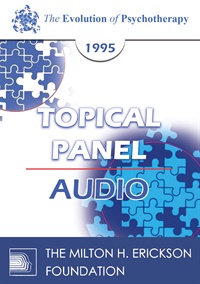EP95 Panel 09 - PTSD and Abuse - Cloe Madanes, Lic. Psychol.; Donald Meichenbaum, PhD; Francine Shapiro, PhD; Lenore Walker, EdD
- Average Rating:
- Not yet rated
- Topic Areas:
- Topical Panels | Post-Traumatic Stress Disorder (PTSD) | Abuse | Psychotherapy
- Categories:
- Evolution of Psychotherapy | Evolution of Psychotherapy 1995 | Pioneers in Couples and Family Therapy
- Faculty:
- Cloe Madanes, HDL, LIC | Donald Meichenbaum, PhD | Francine Shapiro, PhD | Lenore Walker, EdD
- Duration:
- 57 Minutes
- Format:
- Audio Only
- Original Program Date:
- Dec 15, 1995
- License:
- Never Expires.
Description
Description: This panel on post-traumatic stress and abuse presents a range of trauma treatment strategies. Approaches include structured apology and accountability from perpetrators, EMDR's eight-phase trauma processing model, and cognitive-emotional interventions for repeated trauma and battered women’s syndrome. The discussion also underscores the importance of thorough victimization assessments and recognizing the risk of secondary trauma in therapists.
Moderated by Brent Geary, PhD.
Educational Objectives:
- To compare and contrast clinical and philosophical perspectives of experts.
*Sessions may be edited for content and to preserve confidentiality*
Credits
Handouts
| Timestamped Transcript (765 KB) | 17 Pages | Available after Purchase |
| Ericksonian Learning Snapshot (246 KB) | 2 Pages | Available after Purchase |
Faculty

Cloe Madanes, HDL, LIC Related Seminars and Products
Cloé Madanes, HDL, LIC, is a world-renowned innovator and teacher of family and strategic therapy and one of the originators of the strategic approach to family therapy. She has authored seven books that are classics in the field: Strategic Family Therapy; Behind the One-Way Mirror; Sex, Love and Violence; The Violence of Men; The Secret Meaning of Money; The Therapist as Humanist, Social Activist and Systemic Thinker; and Relationship Breakthrough. She has presented her work at professional conferences all over the world and has given keynote addresses for The Evolution of Psychotherapy Conference, the American Association of Marriage and Family Therapy; the National Association of Social Workers, The Erickson Foundation, the California Psychological Association and many other national and international conferences. Madanes has won several awards for distinguished contribution to psychology and has counseled outstanding individuals from all walks of life.

Donald Meichenbaum, PhD Related Seminars and Products
Donald Meichenbaum, Ph.D in Clinical Psychology is currently Research Director of Melissa Institute for Violence Prevention, Miami (melissainstitute.org). He is one of the founders of cognitive behavior therapy. He was voted one of the most influential psychotherapists of the 20th century. Latest books include "Roadmap to Resilience" (www.roadmaptoresilience.com) and "Evolution of Cognitive Behavior Therapy: A Personal and Professional Journey."

Francine Shapiro, PhD Related Seminars and Products
Francine Shapiro, Ph.D., is the originator and developer of EMDR, which has been so well researched that it is now recommended as an effective treatment for trauma in the Practice Guidelines of the American Psychiatric Association, and those of the Departments of Defense and Veterans Affairs. Dr. Shapiro is a Senior Research Fellow Emeritus at the Mental Research Institute in Palo Alto, California, Executive Director of the EMDR Institute in Watsonville, CA, and founder and President Emeritus of the Trauma Recovery EMDR Humanitarian Assistance Programs, a non-profit organization that coordinates disaster response and low fee trainings worldwide.

Lenore Walker, EdD Related Seminars and Products
Lenore Edna Walker, Ed.D., is an American psychologist who founded the Domestic Violence Institute, documented the Cycle of abuse and wrote The Battered Woman, for which she won the Distinguished Media Award in 1979. She was inducted into the Colorado Women's Hall of Fame in 1987. She lived and worked in Denver, Colorado, where she was a licensed psychologist, was a leader in the field of domestic violence, and was president and chief executive officer of Walker & Associates. To research family violence, Walker founded the Domestic Violence Institute.
She has testified as an expert witness in trials involving domestic abuse and had developed domestic violence training programs and drafted legislative reform. Walker interviewed 1,500 women who had been subject to domestic violence and found that there was a similar pattern of abuse, called the "cycle of abuse". She wrote the book The Battered Woman for which she won the Distinguished Media Award the same year.


